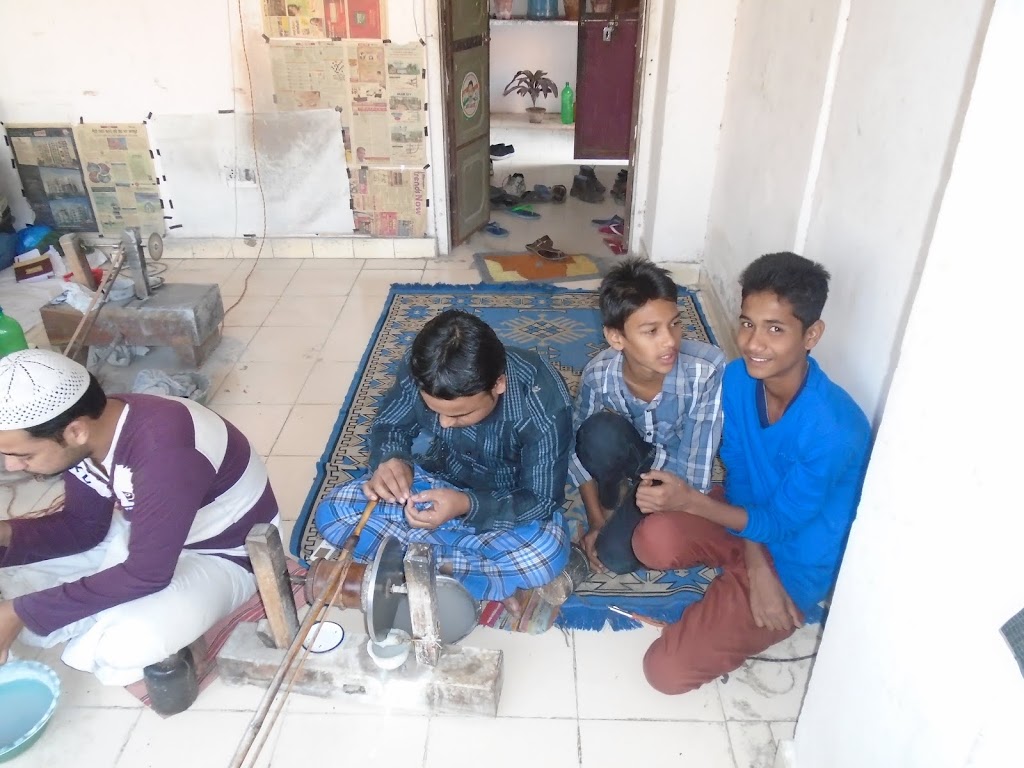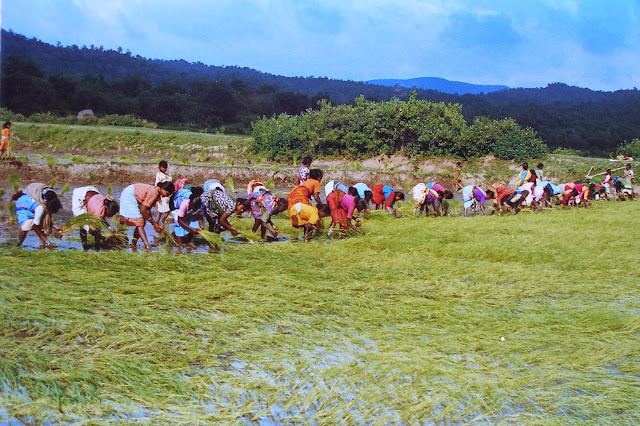Nesar Ahmad
After amending four central labour laws to make them more
business friendly, the Vasundhra Raje government in Rajasthan has now come up
with draft Rajasthan Land Acquisition Bill, 2014, which, if passed and
implemented, will repeal the central act called ‘Right to Fair Compensation and Transparency and Rehabilitation and Resettlement Act, 2013’ in the state of
Rajasthan.
business friendly, the Vasundhra Raje government in Rajasthan has now come up
with draft Rajasthan Land Acquisition Bill, 2014, which, if passed and
implemented, will repeal the central act called ‘Right to Fair Compensation and Transparency and Rehabilitation and Resettlement Act, 2013’ in the state of
Rajasthan.
The proposed bill, uploaded on the Revenue Department’s
website, on which the state government has invited comments/feed back from the stakeholder within 10 days, takes away most of the positive provisions of the 2013 act. The bill
has no provision of Social Impact Assessment (SIA) of the projects before going
for the acquisition and displacement, has reduced the rehabilitation to an
additional 10 percent of the compensation amount, has decreased the
compensation for the urban areas from 2 times of the market value of the land
to the equal to the value of the land and in rural areas also the compensation
amount will be only 1.25 times to 2.5 times of the value of the land within 5
km radius of the urban municipal limit instead of 4 times as the central act
provides for.
website, on which the state government has invited comments/feed back from the stakeholder within 10 days, takes away most of the positive provisions of the 2013 act. The bill
has no provision of Social Impact Assessment (SIA) of the projects before going
for the acquisition and displacement, has reduced the rehabilitation to an
additional 10 percent of the compensation amount, has decreased the
compensation for the urban areas from 2 times of the market value of the land
to the equal to the value of the land and in rural areas also the compensation
amount will be only 1.25 times to 2.5 times of the value of the land within 5
km radius of the urban municipal limit instead of 4 times as the central act
provides for.
One of the most important provisions of the Right to Fair
Compensation and Transparency and Rehabilitation and Resettlement Act, 2013 is
taking prior consent of the people before acquisition in the scheduled areas for
any land acquisition through the gram sabha or the panchayat bodies or other
local bodies and consent of the 80% of the affected population in case of land
acquisition for private projects and 70% of the affected population in case of
the public private partnership (PPP) projects in non-scheduled areas. The Rajasthan Land Acquisition bill gets away
with the provision of taking prior consent of the Gram Sabha or the panchayat
in the scheduled areas and dilutes the provision of the taking consent of the 70%
of the affected population and brings it down to 60% in case of taking land for
the PPP projects.
Compensation and Transparency and Rehabilitation and Resettlement Act, 2013 is
taking prior consent of the people before acquisition in the scheduled areas for
any land acquisition through the gram sabha or the panchayat bodies or other
local bodies and consent of the 80% of the affected population in case of land
acquisition for private projects and 70% of the affected population in case of
the public private partnership (PPP) projects in non-scheduled areas. The Rajasthan Land Acquisition bill gets away
with the provision of taking prior consent of the Gram Sabha or the panchayat
in the scheduled areas and dilutes the provision of the taking consent of the 70%
of the affected population and brings it down to 60% in case of taking land for
the PPP projects.
Another important provision, which is a hallmark of the
Right to Fair Compensation and Transparency and Rehabilitation and Resettlement
Act, 2013, is provision of mandatory rehabilitation and resettlement of the
affected people. Before this act there was no law in the country, which would
compel the displacing agencies to rehabilitate the displaced population. This
act for the first time combined the rehabilitation and resettlement of the
displaced and affected population with the land acquisition and displacement
for any development project. This act provides for rehabilitation and
resettlement of the affected population (including the landless people) and
providing them with facilities like road, safe drinking water, sanitation
facilities, grazing land and water for cattle, panchayat building, post office,
anaganwadi etc. on the rehabilitation site.
Right to Fair Compensation and Transparency and Rehabilitation and Resettlement
Act, 2013, is provision of mandatory rehabilitation and resettlement of the
affected people. Before this act there was no law in the country, which would
compel the displacing agencies to rehabilitate the displaced population. This
act for the first time combined the rehabilitation and resettlement of the
displaced and affected population with the land acquisition and displacement
for any development project. This act provides for rehabilitation and
resettlement of the affected population (including the landless people) and
providing them with facilities like road, safe drinking water, sanitation
facilities, grazing land and water for cattle, panchayat building, post office,
anaganwadi etc. on the rehabilitation site.
The Rajasthan Land Acquisition Bill on its part has
provision of providing 10% (in case of infrastructure projects) of the total
compensation amount and 30% (in case of other projects) of the total
compensation amount as rehabilitation and resettlement cost. The definition of
the infrastructure projects is such that most of the projects can be
categorized as the infrastructure project. The Bill does say, however, that if
the whole village or a number of villages are displaced, “the State Government
shall endeavor, in the alternative, to resettle such village or villages, as
the case may be, if the project affected persons so desire and it is possible
to do so” (Chapter III).
provision of providing 10% (in case of infrastructure projects) of the total
compensation amount and 30% (in case of other projects) of the total
compensation amount as rehabilitation and resettlement cost. The definition of
the infrastructure projects is such that most of the projects can be
categorized as the infrastructure project. The Bill does say, however, that if
the whole village or a number of villages are displaced, “the State Government
shall endeavor, in the alternative, to resettle such village or villages, as
the case may be, if the project affected persons so desire and it is possible
to do so” (Chapter III).
In case of land acquired for a private company the Bill
gives this alternative to the land owners to take a lump sum amount (30% of the
total compensation amount) as rehabilitation and resettlement cost or choose to
receive an annuity of Rs. 3000 per month for twenty years or one time
settlement of Rs. 7.5 lakhs.
gives this alternative to the land owners to take a lump sum amount (30% of the
total compensation amount) as rehabilitation and resettlement cost or choose to
receive an annuity of Rs. 3000 per month for twenty years or one time
settlement of Rs. 7.5 lakhs.
The Rajasthan Bill also has provision for a creating a Land
Acquisition Authority, which will have powers of civil courts but which will
“not be bound by the procedure laid down in the Code of Civil Procedure 1908
but will be guided by the principals of natural justice and subject to the
other provisions of this Act and any rules made under this Act”. Any dispute
related to land acquisition under this Act (if passed and implemented) will
only be heard by this Authority and can be challenged only in the High Court.
Acquisition Authority, which will have powers of civil courts but which will
“not be bound by the procedure laid down in the Code of Civil Procedure 1908
but will be guided by the principals of natural justice and subject to the
other provisions of this Act and any rules made under this Act”. Any dispute
related to land acquisition under this Act (if passed and implemented) will
only be heard by this Authority and can be challenged only in the High Court.
Moreover, the bill, perhaps for the first time, makes any
opposition to the land acquisition a punishable offence. The Bill has provision
of imprisonment for 3 to 6 months and a fine of Rs. 10,000 to Rs. 3 lakhs or
both to whoever “willfully obstructs any person in doing any of the acts
authorized” by the Bill.
opposition to the land acquisition a punishable offence. The Bill has provision
of imprisonment for 3 to 6 months and a fine of Rs. 10,000 to Rs. 3 lakhs or
both to whoever “willfully obstructs any person in doing any of the acts
authorized” by the Bill.
The Bill also has an urgency clause which authorizes the
collector the take possession of any land needed for public purpose after 15
days of publication of notice for acquisition in case of urgency on direction
of the state government. The application of urgency clause in the central act
is restricted to the minimum area required for the defense of India or national
security or for any emergencies arising out of natural calamities or any other
emergency with the approval of the parliament.
collector the take possession of any land needed for public purpose after 15
days of publication of notice for acquisition in case of urgency on direction
of the state government. The application of urgency clause in the central act
is restricted to the minimum area required for the defense of India or national
security or for any emergencies arising out of natural calamities or any other
emergency with the approval of the parliament.
This way the Rajasthan government has designed a land
acquisition Bill which is as strict as the colonial Land Acquisition Act
1894, now replaced by the Right to Fair Compensation and Transparency and
Rehabilitation and Resettlement Act, 2013. It takes away most of the rights
given to the displaced and affected population in the 2013 central act and
gives unlimited power to the state government. Also, the powers of district collector,
which have been restricted in the central act, have again been reinstated by
this Bill.
acquisition Bill which is as strict as the colonial Land Acquisition Act
1894, now replaced by the Right to Fair Compensation and Transparency and
Rehabilitation and Resettlement Act, 2013. It takes away most of the rights
given to the displaced and affected population in the 2013 central act and
gives unlimited power to the state government. Also, the powers of district collector,
which have been restricted in the central act, have again been reinstated by
this Bill.
This move of the Rajasthan government is fairly in line with the Modi government’s resentments for the 2013 act. The central government had called a meeting of the revenue ministers of all the state governments, where, reportedly most of the state governments also pushed for amendments in the central law, which was passed only a year ago with support of most of the political parties. The Rural Development Minister, though still vouching for greater farmers’ interests and keeping the act farmer friendly, has indicated that the Ministry will suggest proposed changes in the act to the Prime Minister Office, who will take the final call.
The changes suggested by the state governments are such that “if all the amendments are made into the new law, it would for all practical purposes, end up being a copy of the previous law (LAA 1894) in new language.” Obviously the central government and the state governments are not able to digest the curtailment in the unlimited power to acquire any land without any proper compensation and any provision to rehabilitation and resettlement and without bothering of the social consequences of displacement caused by the acquisition, which the new law has brought in. The 2013 land acquisition act, was brought in as a measure to undo the historical injustice done to the poor, tribal, small and marginal farmers across the country, who’s land is taken away in the name of development and who are left with a meager compensation amount, without any means of livelihood and rehabilitation.
This act is result of people’s movements against unjust acquisition of land in the name of development and public interest. Though not a perfect piece of legislation, the 2013 act has many positive previsions like taking people’s consent in some cases, mandatory social impact assessment, and legal guarantee of rehabilitation and resettlement of the affected population. Obviously any efforts to amend the act, will result in wider people’s resentment and opposition to the proposed changes have already started to come up. The opposition to the proposed amendments is also likely to come from the BJP’s friendly organisations like Bhartiya Kisan Sangh.
Though the central government now seems to have developed cold feet on the amendment proposals, but as in the case of labour laws, the central government seems to hope that the state governments will take the lead. The business friendly media is also hoping to have found a way out of the 2013 Land Acquisition Act, in form of the draft Rajasthan Land Acquisition Bill, 2014. There is a need, however, to oppose the anti-people and anti farmers amendments being pushed either by the central or the state governments.
This act is result of people’s movements against unjust acquisition of land in the name of development and public interest. Though not a perfect piece of legislation, the 2013 act has many positive previsions like taking people’s consent in some cases, mandatory social impact assessment, and legal guarantee of rehabilitation and resettlement of the affected population. Obviously any efforts to amend the act, will result in wider people’s resentment and opposition to the proposed changes have already started to come up. The opposition to the proposed amendments is also likely to come from the BJP’s friendly organisations like Bhartiya Kisan Sangh.
Though the central government now seems to have developed cold feet on the amendment proposals, but as in the case of labour laws, the central government seems to hope that the state governments will take the lead. The business friendly media is also hoping to have found a way out of the 2013 Land Acquisition Act, in form of the draft Rajasthan Land Acquisition Bill, 2014. There is a need, however, to oppose the anti-people and anti farmers amendments being pushed either by the central or the state governments.
(Note: A shorter version of this article has been published in Rajasthan edition of the Hindustan Times, August 14, 2014.)



